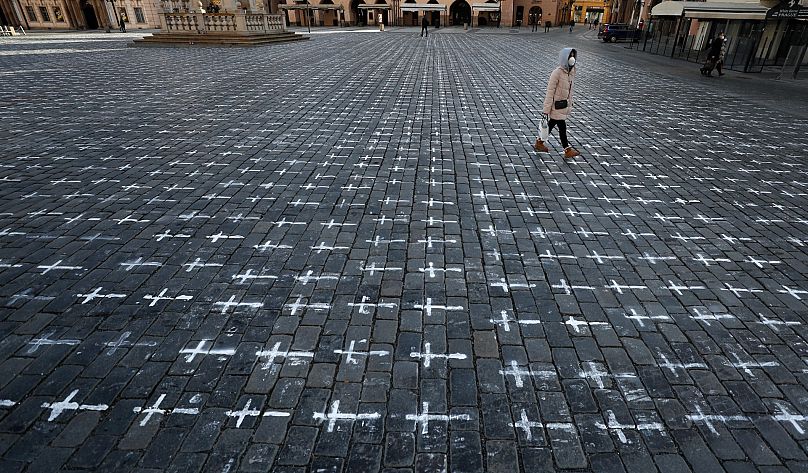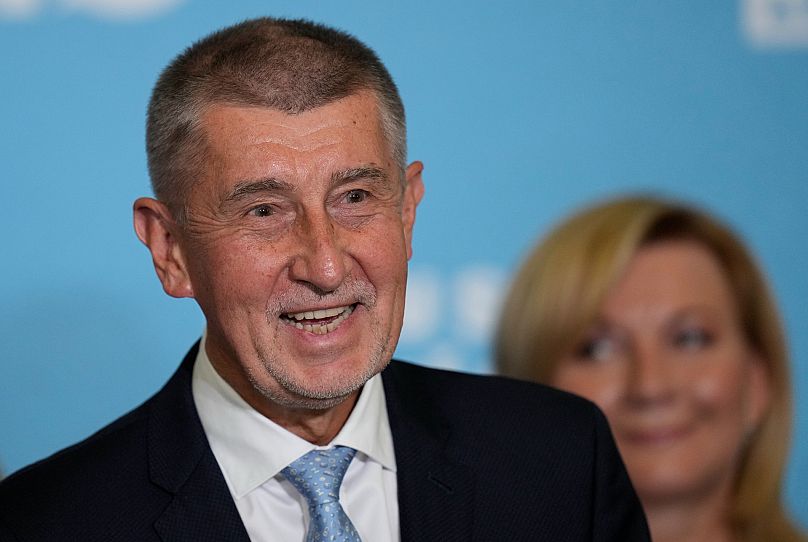Petr Fiala is expected to be confirmed as the new Czech PM this week.
It’s all but certain that Petr Fiala will soon be sworn in as the new prime minister of the Czech Republic, and his prospective centre-right coalition government promises rapid change.
 ADVERTISEMENT
ADVERTISEMENT
 ADVERTISEMENT
ADVERTISEMENT
Fiala, a former historian and university rector, led his SPOLU electoral alliance to victory at legislative elections held in early October, winning the popular vote and picking up 71 seats in parliament.
SPOLU and the PirStan alliance, which won 37 seats, agreed to an informal coalition government arrangement. Last week, Fiala was invited by President Milos Zeman to start formal talks with his coalition partners over the composition of the new cabinet.
The following day, outgoing Prime Minister Andrej Babis sent his resignation letter to the president, though he asked to remain in charge until Fiala’s new cabinet takes power. Fiala’s choices of ministers must now be approved by Zeman -- which may delay proceedings as Zeman has a history of rejecting cabinet picks -- and then receive parliament’s blessing, a surety given its majority in parliament.
Before the legislative elections, it was widely suspected that Zeman might try to allow Babis to remain as prime minister whatever the result, but those alleged plans were scuppered when Zeman was rushed to hospital the day after the ballot. He was released from intensive care last week.
What is at the top of Fiala's in-tray?
“We need to solve the problems which trouble the people as fast as possible, and to lead the country out of the several crises it has been in - health, economic, and a crisis of values,” Fiala was quoted as saying.
Depending on how long the transfer of power takes, Fiala’s government may come into office after the worst of the latest wave of COVID-19 infections.
The Czech Republic's 14-day rate of new infections per 100,000 people hit 820 in the week ending November 7, the highest since March.
Fiala’s government will also inherit major problems with the vaccination campaign, as only 60.3% of the population is fully vaccinated and the number of people coming forward to be inoculated has plateaued in recent weeks.
But Lubomir Kopecek, a professor of political science at Masaryk University, says that in terms of policies “priority number one” for Fiala will be state finances. “Under Babis, the national debt started to rise sharply and the public budget is in big trouble,” he added.
In August, the country’s Supreme Audit Office noted that the Czech national debt was the fourth lowest in the EU by the end of 2020, at 37.7% of the GDP. However, it had increased 7.7% year-on-year and exceeded the CZK 2 trillion (€79.5 billion) mark for the first time. The audit office found that at current rates of spending the country’s national debt would grow at the second-fastest in the EU over the coming years.
The Babis government increased the state budget deficit limit three times during the pandemic, up to a final figure of CZK 500 billion (around €20 billion). The deficit itself in 2020 reached a record high of €14.5 billion. It is expected to be considerably higher by the end of 2021.
Fiala has said his government will try to rework the 2022 budget, which Babis’ outgoing government decided, to cut the deficit down below CZK 300 billion (€12 billion) next year. It is currently set to be around €15 billion.
Primarily this will be done by limiting state expenditure, and cutting or reworking several investment projects. But Fiala’s prospective cabinet has also vowed to cut taxation in some areas, and its traditional centre-right economic policies are expected to assuage the wealthy, in comparison to the increasingly left-wing agenda that Babis’ government took in recent years.
In an interview this week with Czech media, Fiala stressed that his government would only be able to properly correct state finances in the 2023 budget.
Another important improvement will be in rule of law, said Filip Kostelka, a lecturer at the University of Essex. Ever since the billionaire Babis was elected prime minister in 2017, he has been dogged by accusations of corruption, most stemming from alleged abuse of power to favour his sprawling Agrofert conglomerate.
Earlier this year, a European Commission audit found Babis was in conflict of interest over EU subsidies received by Agrofert. Domestic investigations are also ongoing, though they were allegedly stymied during Babis’ premiership.
“Under Fiala, the judicial and police authorities will probably be given much more time and space to investigate the scandals and alleged wrongdoing committed by the members of the outgoing cabinet and Babis himself,” Kostelka said
On foreign policy, both the SPOLU and PirStan coalitions campaigned on a pro-Western agenda, vowing to boost ties with Brussels and Washington. Fiala has vowed to increase Czech contributions to NATO up to the 2% of GDP by 2025
It is believed the progressive Pirate Party will hold the foreign ministry, which will likely see an even greater swing against China and Russia, whose attempts to gain greater influence in the Czech Republic in recent years, led by Zeman, have been a source of controversy.
However, one potential stumbling block for Fiala’s prospective government could be over the EU. Fiala’s Civic Democratic Party (ODS), the largest of the five parties, has long been Eurosceptic, but several of the others, including the Pirate Party, are vehemently pro-Brussels.
To forestall any dispute, the prospective 18-member cabinet will have three new posts including one for EU affairs, which will likely be held by a politician from the Mayors and Independents (STAN). The Czech Republic takes on the rotating EU presidency in July 2022.
“The new coalition may not push for the introduction of the euro in the Czech Republic, but the perception of the Czech Republic will improve compared to Babis’ premiership. The controversies associated with Babis will disappear,” said Kopecek.
Fiaia has insinuated that his government will also tackle cultural issues and has spoken of “a crisis of values” in Czech society. With the prospective government composed mostly of conservative politicians, liberal issues like gay marriage are unlikely to be supported, yet there’s no danger of it going down the Polish road on topics like abortion, a non-issue in the Czech Republic, said Kopecek.
But one of the biggest changes analysts forecast from Fiala’s government will be in tone and temperament.
“In terms of governing the Czech Republic key differences will be a change of style and presentation, not least because of the professorial manner of Fiala,” said Sean Hanley, an associate professor in Central and Eastern European politics at University College London.
Who is Petr Fiala?
Fiala, 57, has some experience in government, having previously served as a Minister of Education, Youth and Sports. But most of his career was spent as an intellectual, rising through academia to become the rector of Masaryk University, one of the Czech Republic’s grandest universities.
Raised in a conservative Catholic family in Brno, Fiala first dipped his toes into politics when he was appointed the chief aide for science to Prime Minister Petr Necas in 2011, before quickly rising to minister position the following year.
At the 2013 general election, he won a seat in the Chamber of Deputies as an independent, but within a month of the ballot, he switched allegiance to the ODS, the traditional centre-right party that suffered one of its worst electoral results in history, finishing fifth with just 7.7% of the vote.
In 2014, Fiala ran for the party presidency, winning the internal ballot easily. At the next legislative election, in 2017, his ODS finished second, almost doubling its vote count from the previous ballot. But Fiala refused to go into a coalition with Babis, forcing ODS to endure the past five years in opposition.
He is “an uncontroversial figure who is also a relatively capable mediator, which is important for maintaining the unity of the new government,” said Kopecek.
By comparison, Babis was a billionaire businessman before entering politics, and he masterminded the populist drive away from the country’s two traditional parties, Fiala’s ODS and the centre-left Social Democrats (CSSD), over the past decade.
Babis vowed to run the government like a business, which has often resulted in a heavy-handed and caustic approach to debate. Fiala, meanwhile, is widely perceived as a soft-speaker who favours consensus over conflict.
What happens next?
Exactly when Fiala will be named prime minister remains in doubt. He told Czech media that it should be “a matter of weeks”.
For now, civility appears to have returned to Czech politics after weeks of post-election anxiety over whether Zeman’s ill-health meant he could continue as president, and whether he would try to keep Babis as prime minister, as many analysts thought he might.
The Senate has now agreed to suspend its plans to invoke Article 66 of the Constitution, which would temporarily deprive the president of his powers. The newly-elected Chamber of Deputies reconvened on Monday for a constitutive session.
On the one hand, Fiala will go into his premiership with momentum behind him. There’s a good deal of relief in the country that Babis’ post-election shenanigans didn’t go as allegedly planned, and that Zeman's ill-health hasn't resulted in a constitutional crisis.
The five parties in Fiala’s prospective government control 108 seats in the 200-seat Chamber of Deputies, a larger share than some previous governments. It has also a strong backing in the Senate, where Fiala’s ODS is the largest party and controls the chamber’s presidency.
However, Babis hasn’t disappeared from politics – and neither has the spectre of populism. Babis’ ANO party commands 72 seats in parliament, the largest of any single party, and it will likely find cooperation with the far-right Freedom and Direct Democracy party (SPD), which has 20 seats, in opposing the Fiala’s government’s actions.
Babis still controls a majority stake in several leading Czech newspapers and media outlets, which analysts expect to take a critical view of Fiala’s attempted reforms.
It is widely suspected that Babis will also attempt to run for presidency with elections due to be held by January 2023 but could be much sooner because of Zeman's poor health.
Babis already appears to be setting himself up as the left-wing and populist challenger, as well as a voice for voters who opted for parties that didn’t cross the 5% threshold needed to enter parliament. Some 19.6% of votes went to parties that didn’t win seats, compared to just 6.2% at the 2017 election.
The Social Democrats, which had been the junior partner in Babis' outgoing government, failed to win any seats in Parliament for the first time in Czech history. So too did the Communist Party of Bohemia and Moravia (KSCM), which informally backed Babis’ government in Parliament.
“Those of you who voted for the Social Democrats, for the Communists or the Oath, to all of you who voted and your parties did not get into the lower house, I want to say that your votes did not fail. I am here for you,” Babis said not long after the election results were announced last month.
If Babis can occupy the position as the defender of the political left, especially as the Fiala’s centre-right government is expected to oversee a decline in state expenditure and slash in taxation, he will likely be the frontrunner for the next president, a post that has taken on more interventionist powers under Zeman since 2013.
“If the new cabinet pushes its fiscal policies too much in the conservative direction, this may provoke a popular backlash and result in a populist revenge in the next legislative but also presidential electoral elections,” Kostelka said.
“By a stroke of luck and thanks to civil society’s mobilisation, Czech liberal democracy has won a battle in 2021,” Kostelka added, “but the war with populism and authoritarianism is far from over.”












